10 Mar2021
By Matthew Wales
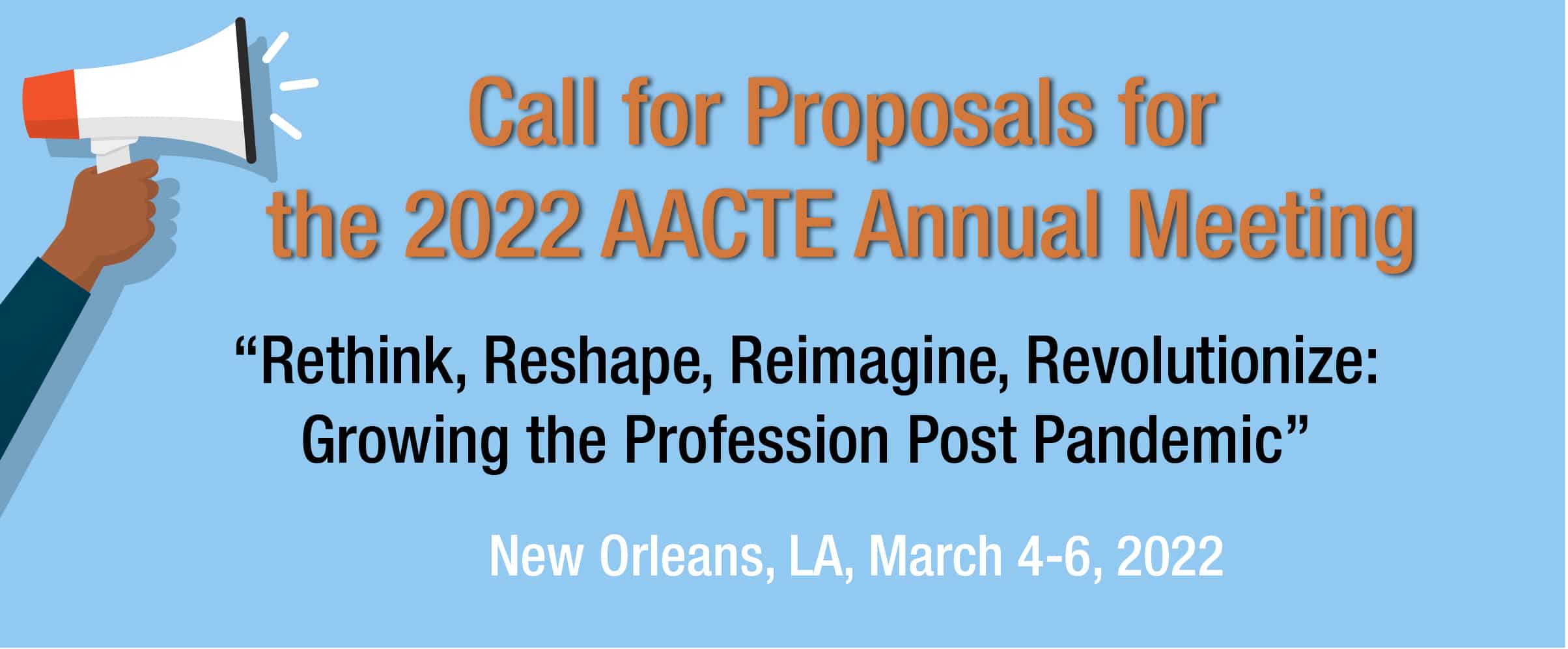 Now through May 28, AACTE is accepting session proposals for the 74th Annual Meeting, to be held in New Orleans, LA, March 4-6, 2022. We also invite applications by May 14 from AACTE member faculty to review proposals.
Now through May 28, AACTE is accepting session proposals for the 74th Annual Meeting, to be held in New Orleans, LA, March 4-6, 2022. We also invite applications by May 14 from AACTE member faculty to review proposals.
The conference theme is “Rethink, Reshape, Reimagine, Revolutionize: Growing the Profession Post Pandemic,” conceptualized as follows in the call for proposals:
The events of 2020 challenged the field of education in dramatic and unprecedented ways. The advent of the pandemic thrust educators into uncharted territory and created a dramatically different, virtual context for teaching and learning. As the COVID‐19 crisis unfolded, teachers and teacher candidates quickly adapted their instruction to incorporate multiple modes of delivery, including virtual, hybrid, and in‐person instruction constrained by masks, plexiglass, and social distancing. The enormous investment of energy required to make the sudden shift, the isolation imposed by the threat of the pandemic, and the separation from colleagues tested the intellect, energy, and emotional resilience of educators. In the midst of this unforeseen and uncharted environment, a pressing challenge arose: addressing the striking inequities of access to technology and learning, clearly delineated along socioeconomic lines, which stood to further expand the achievement gap between white students and their classmates of color.
02 Mar2021
By Gaelle Gilbert
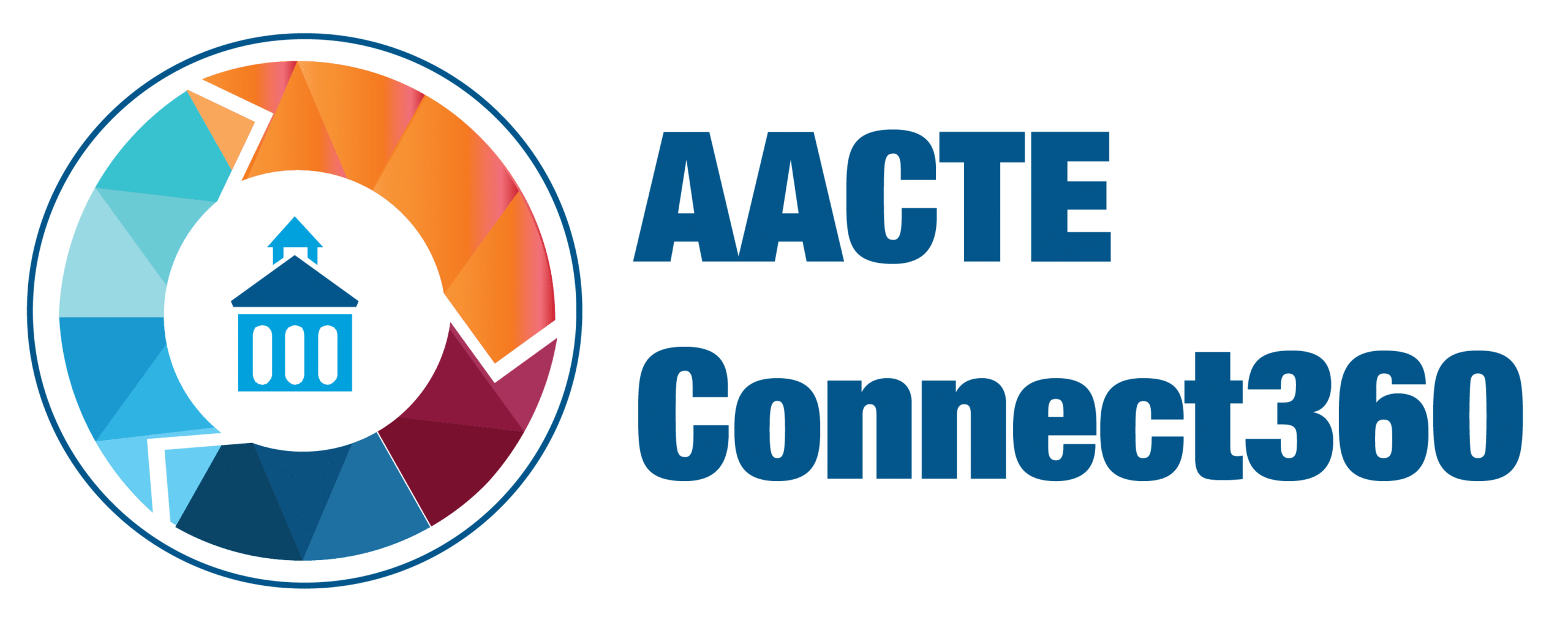
There are several great reasons for starting an online community, like the continuous learning it offers participants and the sense of pride in being part of a group. For members of AACTE, the new online community it is about connecting members, building meaningful relationships, and engaging in critical conversations with each other, Board members and staff. That is why the virtual AACTE 2021 Annual Meeting was a perfect initial launching point for AACTE Connect360.
Through the online community, attendees responded to different threads in the “73rd Annual Meeting” community group. The “Introduce Yourself” thread was a popular choice for new users, allowing others on the platform to learn a little bit more about them and sharing the best piece of advice they received from a mentor or colleague.
02 Mar2021
By Weade James
During AACTE’s 73rd Annual Meeting last week, Pricella Morris, Phllandra Smith, and Moe Green were announced as recipients of the 2021 Holmes Program Dissertation Funding Competition (DFC).
Over the last four years, AACTE has held an annual Holmes Program DFC to support Holmes scholars’ dissertation research related expenses. This annual event is sponsored by AACTE and its partners, including the Council of Academic Deans from Research Education Institutions (CADREI), Teacher Education Council of State Colleges and Universities (TECSCU), the Association of Independent Liberal Arts Colleges of Teacher Education (AILACTE), and the National the National Association of Holmes Scholars Association (NAHSA).
25 Feb2021
By Jacqueline Rodriguez
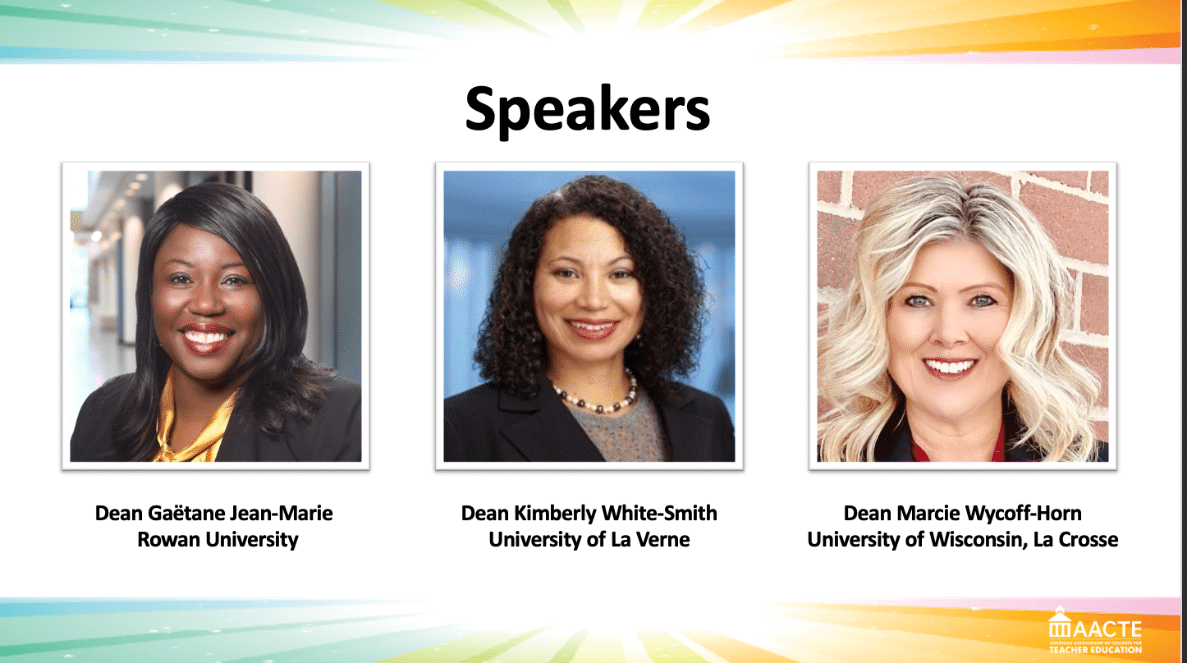
You won’t want to miss AACTE’s next webinar. Join education deans as they discuss how to lean in and lead through the COVID-19 pandemic and the impact of systemic racism on campus and within their communities. Tune into the Leaning in and Leading Through Crisis discussion on March 18 from 2:00 – 3:00 p.m.
25 Feb2021
By Jerrica Thurman
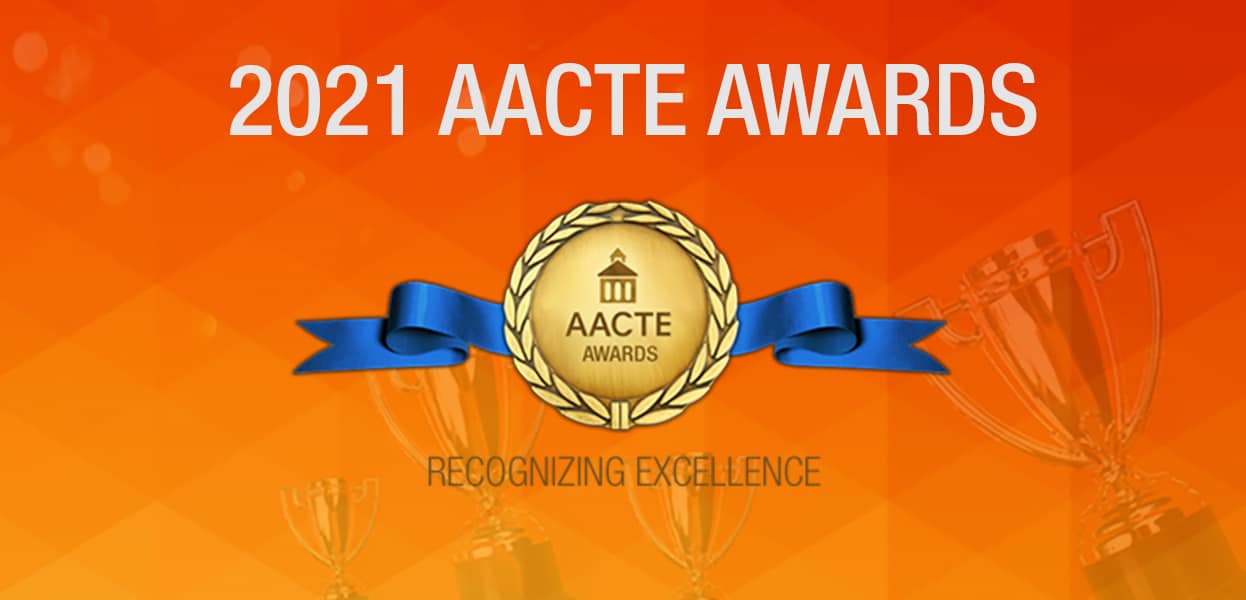 AACTE is pleased to announce the 2021 recipients of its annual awards for innovative research, best practice, and exemplary leadership in educator preparation. The following member institutions and individuals will be honored at the virtual AACTE 73rd Annual Meeting Awards Forum today, 2:45-3:30 p.m.
AACTE is pleased to announce the 2021 recipients of its annual awards for innovative research, best practice, and exemplary leadership in educator preparation. The following member institutions and individuals will be honored at the virtual AACTE 73rd Annual Meeting Awards Forum today, 2:45-3:30 p.m.
25 Feb2021
By Katrina Norfleet
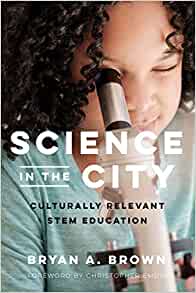 AACTE is pleased to announce Bryan A. Brown’s Science in the City: Culturally Relevant STEM Education, as the recipient of the 2021 AACTE Outstanding Book Award. Brown is being presented with the award at today’s virtual AACTE 73rd Annual Meeting Awards Forum.
AACTE is pleased to announce Bryan A. Brown’s Science in the City: Culturally Relevant STEM Education, as the recipient of the 2021 AACTE Outstanding Book Award. Brown is being presented with the award at today’s virtual AACTE 73rd Annual Meeting Awards Forum.
Science in the City: Culturally Relevant STEM Education, published by Harvard Education Press in 2019, examines how language and culture impact effective science teaching. In the book, Brown argues that teachers need to understand how cultural issues intersect with the fundamental principles of learning, and that science education can thrive if it is connected to students’ culture, backgrounds, identities, and language.
25 Feb2021
By Katrina Norfleet
AACTE is pleased to announce that Teresa Foulger, Kevin Graziano, Denise Schmidt-Crawford and David Slykhuis are the recipients of the 2021 AACTE Edward C. Pomeroy Award for Outstanding Contributions to Teacher Education. The foursome are being recognized for the development of the Teacher Educator Technology Competencies (TETCs) and for their efforts to broadly disseminate the TETCs to teacher educators. The recipients are being presented with the award at today’s virtual AACTE 73rd Annual Meeting Awards Forum.

25 Feb2021
By Katrina Norfleet

AACTE is pleased to announce the University of South Florida (USF) as the recipient of the 2021 AACTE Best Practice Award for Innovative Use of Technology. Ilene Berson, professor of early childhood at USF, is being presented with the award at today’s virtual AACTE 73rd Annual Meeting Awards Forum.
25 Feb2021
By Katrina Norfleet
 AACTE is pleased to announce Sarah “Mia” Obiwo as the recipient of the 2021 AACTE Outstanding Dissertation Award for “Bringing Clarity to the Construct: A Content Analysis of Disposition for Urban Teaching and Learning.” The author completed her dissertation for the Ph.D. at Georgia State University, and she currently serves as assistant professor of early childhood education at the University of Memphis. She is being presented with the award at today’s virtual AACTE 73rd Annual Meeting Awards Forum.
AACTE is pleased to announce Sarah “Mia” Obiwo as the recipient of the 2021 AACTE Outstanding Dissertation Award for “Bringing Clarity to the Construct: A Content Analysis of Disposition for Urban Teaching and Learning.” The author completed her dissertation for the Ph.D. at Georgia State University, and she currently serves as assistant professor of early childhood education at the University of Memphis. She is being presented with the award at today’s virtual AACTE 73rd Annual Meeting Awards Forum.
25 Feb2021
By Katrina Norfleet

AACTE is pleased to announce authors of the article, “Rethinking High-Leverage Practices in Justice-Oriented Ways,” as the recipient of the 2021 AACTE Outstanding Journal of Teacher Education Article Award. Published in the September/October 2020 issue of the journal, the authors of the article, Angela Calabrese Barton of University of Michigan, Edna Tan of University of North Carolina at Greensboro, and Daniel J. Birmingham of Colorado State University are being presented with the award at today’s virtual AACTE 73rd Annual Meeting Awards Forum.
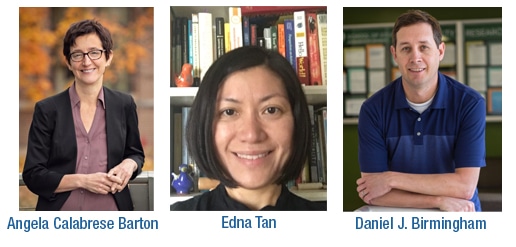
“There is much to admire and value about the scholarship that Calabrese Barton, Tan, and Birmingham report in this award-winning piece,” said Elizabeth Birr Moje, dean of the School of Education, University of Michigan. “Their ambitious pursuit of justice-oriented teaching practice, conducted in partnership with teachers, makes invaluable contributions to our understanding of how educators engage in socially transformative teaching.”
24 Feb2021
By Jerrica Thurman
The 73rd Annual Meeting of the American Association of Colleges for Teacher Education (AACTE) begins today. The conference, themed “Resisting Hate, Restoring Hope: Engaging in Courageous Action,” is being held virtually February 24 – 26. Attendees include deans, faculty, students, and administrators from undergraduate and graduate education programs, community colleges, and PK-12 schools, as well as representatives from state and federal agencies, nonprofit organizations, and foundations.
The past year has presented the educational system with many challenges. The onset of the pandemic, incidents of racial injustice, and the digital divide magnified the systemic challenges occurring in PK-16 environments that serve the nation’s most vulnerable populations—students of color, students with disabilities, students from immigrant families, students from low-income families, and LGBTQ students. Under its 2021 theme, the AACTE conference offers attendees hundreds of concurrent sessions that explore how to revolutionize U.S. educational systems and practices to better serve all learners, dismantle inequities, and assure that no child’s future is determined by their race or socioeconomic background.
22 Feb2021
By Jerrica Thurman
19 Feb2021
By Jerrica Thurman
Celebrate Excellence in Educator Preparation at #AACTE21
Join AACTE and colleagues as we honor institutions and individuals for their significant contributions to the field of educator preparation during the 2021 AACTE Awards Forum. New this year, the Awards program will be a 30-minute presentation highlighting all award winners during the AACTE 73rd Annual Meeting. The AACTE Awards Forum will take place at 2:45 p.m. ET on Thursday, February 25.
The Opening Keynote session will also offer a stellar lineup of presenters, including distinguished guests U.S. Senator Elizabeth Warren, U.S. Senator Jack Reed, U.S. Representative Alma Adams, Dr. Karen Marrongelle, and Dr. Leslie T. Fenwick. Learn more about the keynote speakers.
18 Feb2021
By Jon Clausen
As we head toward the one year mark of the onset of the pandemic, there are many lessons learned in how we prepare candidates to use technology in education, however, there is still much to discover. At AACTE 2021 Annual Meeting, the AACTE Committee on Innovation and Technology will be presenting a Deeper Dive session, “Applying Technology-enhanced Teaching Strategies to the New Normal in 2021 and Beyond” on Thursday, February 25, 11:15 a.m. – 12:30 p.m., that looks back at the past year and how teacher education programs have responded to preparing candidates during this time. The session will also focus on how programs are moving beyond the current health crisis and how they are preparing candidates to use technology in ways that support teaching and learning to enter face-to-face, remote, and hybrid classroom environments.
In the spring of last year, when school doors closed and learning went online due to the pandemic, many school districts were left flatfooted in trying to tackle this new emergency instructional situation. Not only did they face infrastructure, access, equity, and professional development challenges, but perhaps more importantly, student engagement in the learning process was lost or disrupted in significant ways.
18 Feb2021
By Christina Sneed
“The 1619 Project” Annual Meeting Deeper Dive session on Friday, February 26, 11:15 a.m. – 12:30 p.m. features Mary Elliott, curator at the Smithsonian National Museum of African American History and Culture (NMAAHC), and Christina Sneed, high school AP English teacher in University City Schools (outside of St. Louis, MO) who taught The 1619 Project and authored the curriculum resources for The Pulitzer Center’s 1857 Project. Inspired by The 1619 Project (which reframes U.S. history by placing the consequences of slavery and the contributions of Black Americans at the very center of the historical narrative), The 1857 Project examines the Dred Scott decision and the Lincoln-Douglass Debate. In this article, Sneed shares insight into her experience teaching The 1619 Project to higher schoolers and how educators can successfully implement it across curriculum.
 I’ve been sharing my approach to teaching with the New York Times’ 1619 Project and was disturbed to read an article where Rodriguez (2021) explained that Republican lawmakers in five states (one in which I live) are introducing legislation to “punish schools that provide lessons derived from this project.” Unfortunately, we’ve seen this strategy used throughout history as a method to manipulate national memory. It forces reflection on the quandary, “Who gets to write history?” The answer is rooted in white supremacy. Recollect America’s Reconstruction period when the United Daughters of the Confederacy distorted the narrative surrounding who won the Civil War by using propaganda, monuments, and education-based indoctrination. They created state-sanctioned counter narratives that still plague America. Recently, Republicans used this tactic to establish the 1776 Commission in opposition to the 1619 Project. Such acts stem from fear that, if average Americans learn accurate accounts of history—without white washing, omission, erasure—white men will lose power. They fear teachers will inform students of America’s ugliest parts and sell a version of history that negatively depicts certain groups of people in order to create ”heroes” and “patriots” in others (what they’ve been guilty of for centuries).
I’ve been sharing my approach to teaching with the New York Times’ 1619 Project and was disturbed to read an article where Rodriguez (2021) explained that Republican lawmakers in five states (one in which I live) are introducing legislation to “punish schools that provide lessons derived from this project.” Unfortunately, we’ve seen this strategy used throughout history as a method to manipulate national memory. It forces reflection on the quandary, “Who gets to write history?” The answer is rooted in white supremacy. Recollect America’s Reconstruction period when the United Daughters of the Confederacy distorted the narrative surrounding who won the Civil War by using propaganda, monuments, and education-based indoctrination. They created state-sanctioned counter narratives that still plague America. Recently, Republicans used this tactic to establish the 1776 Commission in opposition to the 1619 Project. Such acts stem from fear that, if average Americans learn accurate accounts of history—without white washing, omission, erasure—white men will lose power. They fear teachers will inform students of America’s ugliest parts and sell a version of history that negatively depicts certain groups of people in order to create ”heroes” and “patriots” in others (what they’ve been guilty of for centuries).
 Now through May 28, AACTE is accepting session proposals for the 74th Annual Meeting, to be held in New Orleans, LA, March 4-6, 2022. We also invite applications by May 14 from AACTE member faculty to review proposals.
Now through May 28, AACTE is accepting session proposals for the 74th Annual Meeting, to be held in New Orleans, LA, March 4-6, 2022. We also invite applications by May 14 from AACTE member faculty to review proposals.








 AACTE is pleased to announce the 2021 recipients of its annual awards for innovative research, best practice, and exemplary leadership in educator preparation. The following member institutions and individuals will be honored at the virtual
AACTE is pleased to announce the 2021 recipients of its annual awards for innovative research, best practice, and exemplary leadership in educator preparation. The following member institutions and individuals will be honored at the virtual  AACTE is pleased to announce Bryan A. Brown’s Science in the City: Culturally Relevant STEM Education, as the recipient of the 2021 AACTE Outstanding Book Award. Brown is being presented with the award at today’s virtual AACTE 73rd Annual Meeting Awards Forum.
AACTE is pleased to announce Bryan A. Brown’s Science in the City: Culturally Relevant STEM Education, as the recipient of the 2021 AACTE Outstanding Book Award. Brown is being presented with the award at today’s virtual AACTE 73rd Annual Meeting Awards Forum.

 AACTE is pleased to announce Sarah “Mia” Obiwo as the recipient of the 2021 AACTE Outstanding Dissertation Award for “Bringing Clarity to the Construct: A Content Analysis of Disposition for Urban Teaching and Learning.” The author completed her dissertation for the Ph.D. at Georgia State University, and she currently serves as assistant professor of early childhood education at the University of Memphis. She is being presented with the award at today’s virtual AACTE 73rd Annual Meeting Awards Forum.
AACTE is pleased to announce Sarah “Mia” Obiwo as the recipient of the 2021 AACTE Outstanding Dissertation Award for “Bringing Clarity to the Construct: A Content Analysis of Disposition for Urban Teaching and Learning.” The author completed her dissertation for the Ph.D. at Georgia State University, and she currently serves as assistant professor of early childhood education at the University of Memphis. She is being presented with the award at today’s virtual AACTE 73rd Annual Meeting Awards Forum.

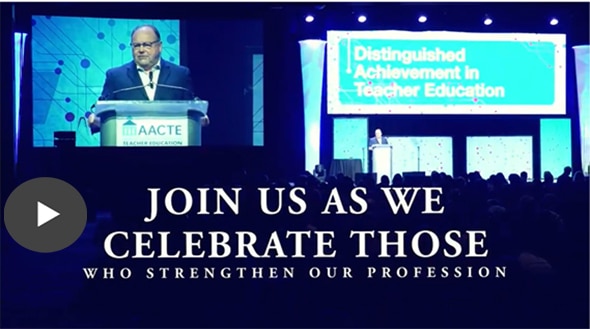
 I’ve been sharing my approach to teaching with the New York Times’ 1619 Project and was disturbed to read an article where Rodriguez (2021) explained that Republican lawmakers in five states (one in which I live) are introducing legislation to “punish schools that provide lessons derived from this project.” Unfortunately, we’ve seen this strategy used throughout history as a method to manipulate national memory. It forces reflection on the quandary, “Who gets to write history?” The answer is rooted in white supremacy. Recollect America’s Reconstruction period when the United Daughters of the Confederacy distorted the narrative surrounding who won the Civil War by using propaganda, monuments, and education-based indoctrination. They created state-sanctioned counter narratives that still plague America. Recently, Republicans used this tactic to establish the 1776 Commission in opposition to the 1619 Project. Such acts stem from fear that, if average Americans learn accurate accounts of history—without white washing, omission, erasure—white men will lose power. They fear teachers will inform students of America’s ugliest parts and sell a version of history that negatively depicts certain groups of people in order to create ”heroes” and “patriots” in others (what they’ve been guilty of for centuries).
I’ve been sharing my approach to teaching with the New York Times’ 1619 Project and was disturbed to read an article where Rodriguez (2021) explained that Republican lawmakers in five states (one in which I live) are introducing legislation to “punish schools that provide lessons derived from this project.” Unfortunately, we’ve seen this strategy used throughout history as a method to manipulate national memory. It forces reflection on the quandary, “Who gets to write history?” The answer is rooted in white supremacy. Recollect America’s Reconstruction period when the United Daughters of the Confederacy distorted the narrative surrounding who won the Civil War by using propaganda, monuments, and education-based indoctrination. They created state-sanctioned counter narratives that still plague America. Recently, Republicans used this tactic to establish the 1776 Commission in opposition to the 1619 Project. Such acts stem from fear that, if average Americans learn accurate accounts of history—without white washing, omission, erasure—white men will lose power. They fear teachers will inform students of America’s ugliest parts and sell a version of history that negatively depicts certain groups of people in order to create ”heroes” and “patriots” in others (what they’ve been guilty of for centuries).